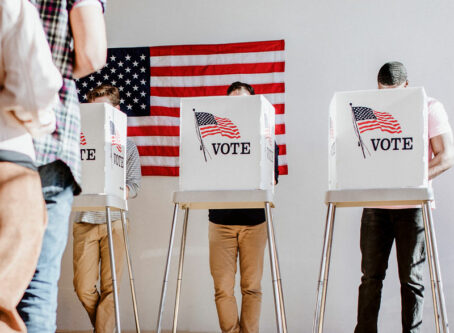State elect governors, set stage for coming years
Voters across the country cast their ballots in November for 82 percent of the elected officials who make up federal and state government, including governors, as well as many local offices.
Understandably, many headlines in the mainstream national media focused on the congressional races following Election Day. However, voters made many other significant choices when they cast ballots in their home states.
Although federal rules govern much of the trucking industry, the power of the states has a major impact on professional drivers’ daily lives in terms of tolling, truck rules, and taxes and fees.
Democrats make gain in governorships
Election Day saw 36 states select governors. The chief executives have a far-reaching effect on government, including transportation funding for the foreseeable future.
Before Election Day, Republicans held a 33-16 edge among governors nationally. Alaska Gov. Bill Walker is an independent. Afterwards, the GOP appears to claim a margin of 27-23 with unofficial results in Georgia.
Of the nearly three-quarters of all states voting for governor, 17 races were open seats from both parties, thanks to terms limits and incumbents choosing not to run for re-election.
Sitting Democratic governors in Hawaii, New York, Pennsylvania, Rhode Island and Oregon retained their offices. Incumbent Republican governors in Alabama, Arizona, Arkansas, Iowa, Maryland, Massachusetts, Nebraska, New Hampshire, South Carolina, Texas and Vermont were also victorious.
Governors who lost their seats are Bruce Rauner in Illinois and Scott Walker in Wisconsin.
Rauner recently directed the Illinois Department of Transportation to establish “Autonomous Illinois.” The initiative has the goal to develop a testing program for connected and autonomous vehicles.
The outgoing Republican governor also has said he opposes pursuit of a vehicle-miles-traveled tax.
J.B. Pritzker, Illinois’ governor-elect, has attempted to distance himself from comments made earlier this year that he would consider a vehicle-miles-traveled tax to fund transportation work. On the campaign trail recently the Democrat said VMT is something that the state should look into to address decreasing fuel tax revenues.
In Wisconsin, Gov. Scott Walker pursued various plans to improve the state’s roads while ruling out a fuel tax increase and tolls. Incoming Gov. Tony Evers, a Democrat, has said he would support raising the state’s fuel tax rate.
Democrats wrested open governor seats held by Republicans in Kansas, Maine, Michigan, Nevada and New Mexico. The GOP added Alaska to their column, where the outgoing governor is an Independent.
Michigan Gov.-elect Gretchen Whitmer has called for spending $2 billion a year more on infrastructure projects. The Democrat wants to use the money to fund a statewide infrastructure bank to provide low-interest loans to agencies looking to fix roads. She advocates raising the fuel tax or vehicle registration fees to pay for the work.
In New Mexico, Gov.-elect Michelle Lujan Grisham wants to use a portion of the state’s surplus revenues for infrastructure projects. She has also called for expanding use of the state’s infrastructure bank.
New Republican governors elected in Florida, Georgia, Idaho, Ohio, Oklahoma, South Dakota, Tennessee and Wyoming held on to their party’s seat. California, Colorado, Connecticut and Minnesota were retained by Democrats.
Ohio’s Gov.-elect, Mike DeWine, advocates for appointing a commission to study transportation funding needs. A fuel tax increase is among the possible solutions.
The soon-to-be governor in California, Gavin Newsom, opposed Proposition 6 to repeal fuel tax and vehicle fee increases enacted one year ago.
Colorado Gov.-elect Jared Polis says he will pursue legislative support to use general funds for transportation improvements.
In Minnesota, Gov.-elect Tim Walz campaigned on a proposal to raise the fuel tax rate by 10 cents.
With this year’s elections concluded, both parties turn their attention to 2020. At that time, nine states will elect governors. Of those, Montana Democratic Gov. Steve Bullock is term limited and is not eligible to seek re-election.
In eight states, five Republicans and three Democrats can pursue another term.









